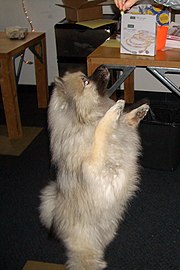
The Keeshond (pronounced /ˈkeɪzhɒnd/ or KAYZ-hond; plural: Keeshonden) is a medium-sized dog with a plush two-layer coat of silver and black fur with a 'ruff' and a curled tail, originating in Germany. Its closest relatives are the other German spitzes such as the Pomeranian. Originally called the German Spitz, more specifically the Wolfsspitz, the name was officially changed to Keeshond in England, where it had been known as the Dutch Barge Dog, in 1926.
A member of the spitz group of dogs, the Kees in AKC standard is 17 to 18 inches (about 45 cm) tall and 19.25 (46 cm) ± 2.4 inches (6 cm) in the FCI standard and weighs 35 to 45 pounds (about 16 to 18 kg). Sturdily built, they have a typical spitz appearance, neither coarse nor refined. They have a wedge shaped head, a medium-length muzzle with a definite stop, small pointed ears and an expressive face. The tail is tightly curled and, in profile, should be carried such that it is indistinguishable from the compact body of the dog.

Keeshonden tend to be very playful, with quick reflexes and strong jumping ability. They are quick learners and eager to please. Because Keeshonden are quick learners, they also learn the things you didn't necessarily wish to teach them - very quickly. However, Keeshonden make excellent agility and obedience dogs. So amenable to proper training is this bright, sturdy dog that Keeshonden have been successfully trained to serve as guide dogs for the blind; only their lack of size has prevented them from being more widely used in this role.
They love children and are excellent family dogs, preferring to be close to their humans whenever possible. They generally get along with other dogs as well and will enjoy a good chase around the yard. Keeshonden are very intuitive and empathic and are often used as comfort dogs. Most notably, at least one Keeshond, Tikva, was at Ground Zero on 9/11 to help comfort the rescue workers.[1] The breed has a tendency to become especially clingy towards their owners, even in comparison to other dogs. If their owner is out, or in another room behind a closed door, they may sit, waiting for their owner to reappear, even if there are other people nearby. Many have been referred to as their "owner's shadow," or "velcro dogs".

They are known by their loud distinctive bark. Throughout the centuries, the Keeshond has been a very popular as watch dog on manors in the Netherlands and middle Europe, this trait is evident to this day, and they are alert dogs that warn their owners of any new visitors. Despite being a loud and alert watch dog, Keeshonden are not aggressive towards visitors. They generally welcome visitors affectionately once their family has accepted them. Unfortunately, barking may become a problem if not properly handled. As with other watch dogs, Keeshonden have a distinct territory that they want to guard. Therefore, a happy Keeshond should have a yard to watch out for.(Wikipedia)

